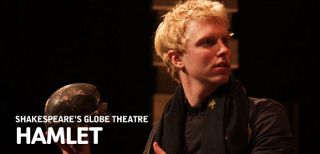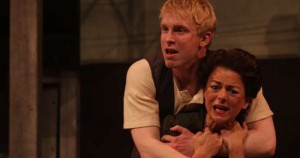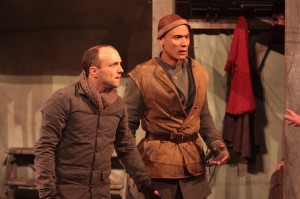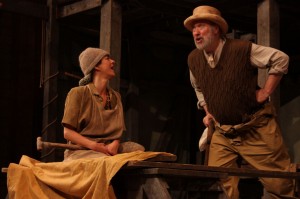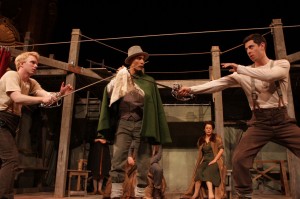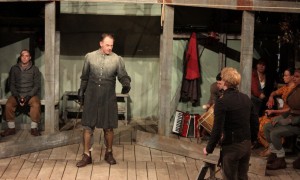THERE IS NOTHING LIKE A DANE
The Globe Theater of London brings its touring production of Shakespeare’s tale of the Melancholy Great Dane to the Michael Schimmel Center, and one is tempted to joke that something is indeed stinking in this State of Denmark, since just outside the theatre, one can perceive the odors emanating from the nearby Fulton Fish Market.
In case you are unaware, The London Globe is the institution that has been built to many of the specifications and dimensions of the original theater in which Shakespeare staged his earlier plays. It boasts an open-air facility for shows to be performed in during the day, with ample standing area in front of the stage from which the “Groundlings” can watch the show. One has always wanted to know what the new Globe’s policy might be if the Groundlings engaged in the rituals (popular during the 16th century) of jeering at the actors, pelting them with rotten fruit when the acting is bad, and defecating on the straw-covered floor as the mood hits them. I imagine that the theater management would have issues with this sort of behavior.
For this touring production, co-directors Dominic Dromgoole and Bill Buckhurst strive to create the feel of an Elizabethan production within the ultramodern environs of the Schimmel Center. For instance, the house lights are left on throughout the house to simulate the tradition of daytime, open-air performances. Likewise much of the action occurs either on Jonathan Fensom’s lovely Elizabethan stage of wooden platforms and balconies, or in the audience area itself.
Mind you, these attempts to re-create the mood and tone of the theater as Shakespeare would have recognized it are admittedly half-hearted at best: The Michael Schimmel theater, with its lovely padded chairs and air conditioned house, is by no means an Elizbethan construct – and audiences attending the show are certainly in no danger of catching the pox from Molly Claptrap or in having their pockets picked by Slick-Fingered Nell.
More intriguing are the attempts to perform the show as a “pure” Shakespearean experience. For the text, the directors utilize one of the older, longer folios of the play, which boasts interchanges and patches of dialogue that are more often pruned for pacing in modern productions. This is actually delightful, revealing moments that viewers may not often have seen, such as parts of the gravediggers’ scene and of the conversation between Christopher Saul’s excellently pompous Polonious and Matthew Romain’s brittle Laertes.
Keeping to the motif of timeless-over-modern, Dromgoole and Buckhurst’s production is stripped down and flexibly lean in terms of presentation. This is not one of those Hamlets that crackle with Freudian undercurrents or layers of brooding subtext. What is on the page is what we see on the stage – there seems to be little Oedipal gooeyness between Hamlet and his mother, for instance, nor is Claudius depicted as an oily modern day politician, oozing his way to the top in iambic pentameter.
Instead, Michael Benz’s wiry, tow-headed Hamlet is depicted as a quixotic adolescent, veering from an uncomprehending rage to a silly, quirky prattle. Emotionally, he cuts quite a childish Hamlet, with none of the post-modern angst traduced by other iterations of this character. And when he’s not engaged in plotting revenge for his father’s murder, he’s a bit of a clown, prancing and joking around the stage, with some of his line readings putting us in mind of old Monty Python sketches. At times, we’re left with the idea that, even though this is a serious business, Benz wants to create a Hamlet who doesn’t take the people around him seriously – he doesn’t trust a soul aside from himself, and perhaps his pal Horatio.
By constrast, Dickson Tyrrell’s Claudius, resplendent in a royal cloak and a huge whiskery walrus mustache that inevitably puts the viewer in mind of Dabney Coleman from the movie 9 to 5, is simply an ambitious tyrant whose hunger for power has driven him past his appalling limit. Miranda Foster’s Gertrude is simply a loving mother who has married Claudius due to some kind of emotional need (and who hasn’t examined too deeply her motivations for wedding so quickly after the death of her first husband). Carlyss Peer’s bubbly, girlish Ophelia shifts from sweet ingénue to babbling loon-lady as the result of the shock caused by her father’s murder at the hands of the man she loves.
We have become so used to this play being so caparisoned with layers of subtext in modern productions that when they are removed, the show feels like it’s missing depth or edge. The show is never able to entirely lose its “old fashioned” quality; we find ourselves glancing at the performers to see if they are going to give us clues to any deeper, ulterior meaning; when it is obviously not there (due, in fact, to their art, rather than a lack of ability on their part), we’re somehow unsettled. This, of course, is the fault of our own expectations. Hardly anyone performs Shakespeare anymore without some kind of an imposed “interpretation.”
Yet, it’s clear from the assured nature of the stagecraft – the crisp pacing and talented, impassioned line readings – that if the cast wanted to put on that particular kind of Shakespeare, they could. It’s that Dromgoole and Buckhurst have instead opted for a more timeless evocation of the play that’s beautifully straightforward and taut with energy and intensity. And the lack of an external reinvention of the play may actually permit the work to edge closer to what the author might have intended when he wrote it, which is itself fascinating to contemplate.
photographs by Fiona Moorhead
Hamlet
Globe Theater at the Schimmel Center for the Performing Arts/Pace University
playing until October 7, 2012
for tickets call 866-811-4111 or visit PACE
then continues on US Tour through November 25, 2012
for tour dates and tickets visit HAMLET
